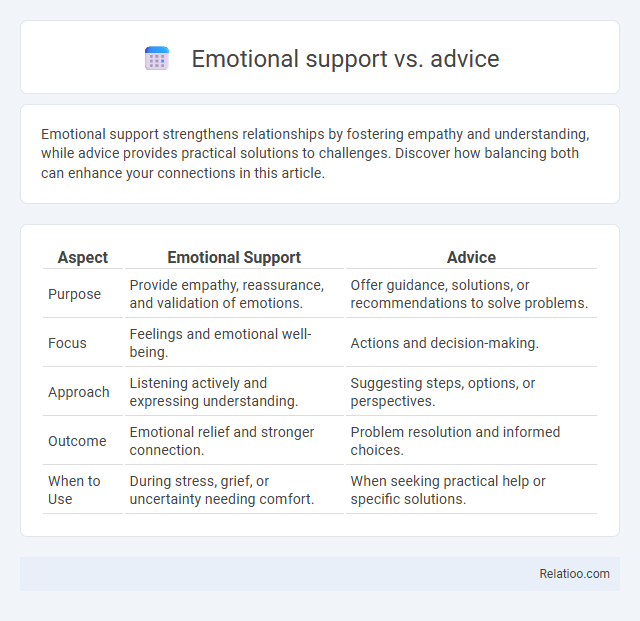Emotional support strengthens relationships by fostering empathy and understanding, while advice provides practical solutions to challenges. Discover how balancing both can enhance your connections in this article.
Table of Comparison
| Aspect | Emotional Support | Advice |
|---|---|---|
| Purpose | Provide empathy, reassurance, and validation of emotions. | Offer guidance, solutions, or recommendations to solve problems. |
| Focus | Feelings and emotional well-being. | Actions and decision-making. |
| Approach | Listening actively and expressing understanding. | Suggesting steps, options, or perspectives. |
| Outcome | Emotional relief and stronger connection. | Problem resolution and informed choices. |
| When to Use | During stress, grief, or uncertainty needing comfort. | When seeking practical help or specific solutions. |
Understanding Emotional Support
Understanding emotional support involves recognizing its role in validating your feelings without judgment or unsolicited solutions. Unlike advice, which offers specific guidance, emotional support centers on empathetic listening and acknowledging your experience. Reconnection strengthens emotional bonds by fostering trust and openness, creating a safe space for genuine emotional support.
Defining Advice in Relationships
Advice in relationships involves offering specific guidance or suggestions aimed at solving problems and improving outcomes, emphasizing practical solutions over emotional comfort. It differs from emotional support, which focuses on empathetic listening and validation of feelings without directing actions. Reconnection, by contrast, centers on reestablishing trust and intimacy rather than solving immediate issues or providing comfort.
Key Differences: Emotional Support vs Advice
Emotional support involves empathetic listening and validating your feelings without judgment, creating a safe space for emotional expression. Advice centers on offering practical solutions or guidance aimed at resolving specific problems you face. The key difference lies in emotional support prioritizing understanding and connection, whereas advice focuses on actionable steps and problem-solving.
When to Offer Emotional Support
Offer emotional support when individuals express feelings of distress, confusion, or vulnerability, as it validates their emotions and fosters trust. Avoid jumping to advice unless explicitly requested, since unsolicited suggestions can feel dismissive and hinder genuine connection. Prioritize active listening and empathy to strengthen emotional bonds before attempting reconnection or problem-solving.
When Giving Advice Is Appropriate
Giving advice is appropriate when you have relevant experience or expertise that can genuinely help Your situation. Emotional support is crucial for validating feelings, but advice becomes valuable when practical guidance or solutions are needed. Recognizing the right moment to shift from empathy to advice ensures your input is both timely and effective.
Common Pitfalls: Mixing Support and Advice
Mixing emotional support with advice often leads to misunderstandings, as individuals seeking empathy may feel judged or pressured when offered solutions. Emotional support centers on validating feelings and active listening, while advice shifts the focus to problem-solving and direction. Recognizing this distinction prevents common pitfalls, fostering clearer communication and better meeting the needs of those seeking comfort or guidance.
The Impact on Personal Relationships
Emotional support enhances trust and empathy, fostering deeper connections by validating feelings and reducing stress in personal relationships. Advice can provide practical solutions but may sometimes create distance if perceived as judgmental or unsolicited, affecting openness between individuals. Reconnection restores bonds by rekindling communication and shared experiences, crucial for healing rifts and strengthening long-term relational resilience.
How to Ask for What You Need
Clearly expressing your emotions helps you receive emotional support by allowing others to understand your feelings without unsolicited advice. Asking for advice requires framing your request with specific questions or guidance you seek, ensuring the response is relevant and actionable. When aiming for reconnection, communicate your desire for shared experiences or quality time, highlighting the importance of rebuilding emotional closeness.
Effective Communication Techniques
Effective communication techniques differentiate emotional support, advice, and reconnection by focusing on active listening, empathy, and clarity. Emotional support requires validating feelings and providing a non-judgmental space, whereas advice centers on offering practical solutions and informed guidance. Reconnection emphasizes open dialogue and mutual understanding to rebuild trust and strengthen relationships.
Building Emotional Intelligence
Building emotional intelligence involves distinguishing between emotional support, advice, and reconnection to enhance your interpersonal skills effectively. Emotional support prioritizes empathy and active listening, creating a safe space for feelings, while advice offers solutions or guidance to navigate challenges. Reconnection fosters deeper bonds by restoring trust and understanding, essential for emotional growth and resilience.

Infographic: Emotional support vs advice
 relatioo.com
relatioo.com